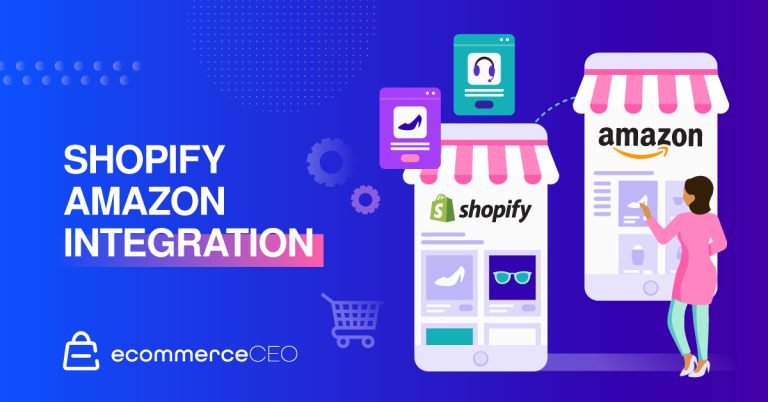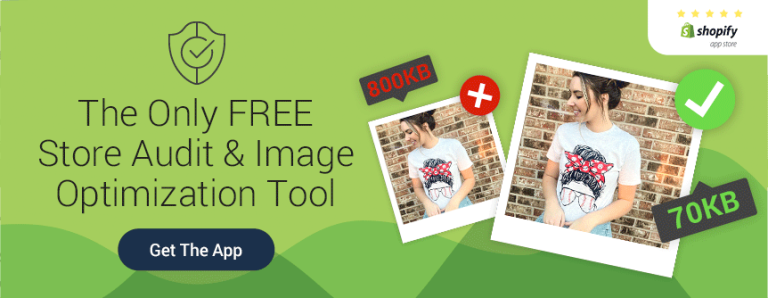The shipping process is one of the most important aspects of running an ecommerce business. After all, you want to make sure your orders reach your customers safely and quickly.
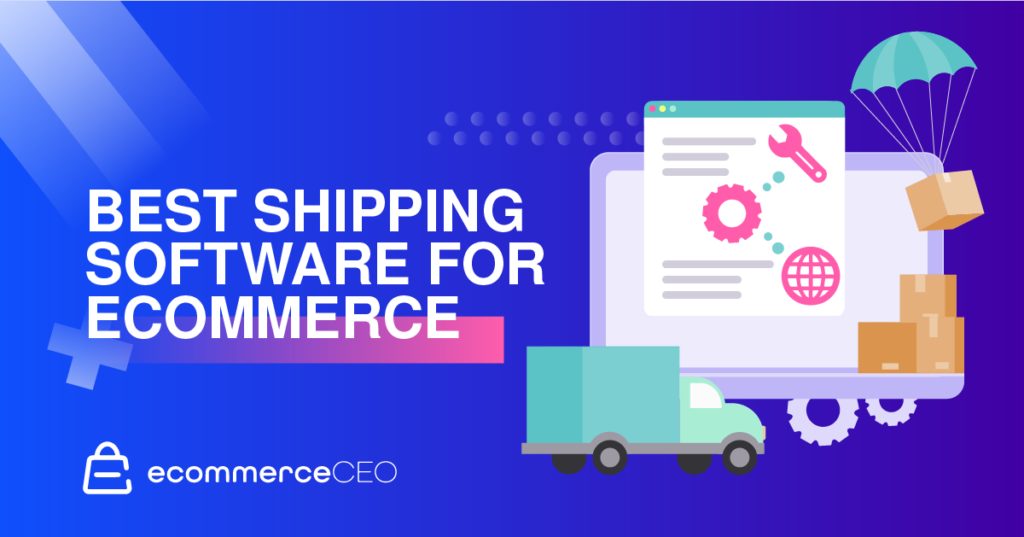
It’s essential that you have a reliable shipping software solution in place to help manage your orders, shipments, and inventory.
While there are many options out there, I’ve compiled the seven best shipping software for ecommerce so you can find what works best for your online store.
What is Ecommerce Shipping?
Ecommerce shipping covers the journey of your product. From boxing in the warehouse to delivering it to your customer’s doorstep, ecommerce shipping is all-encompassing.
Any and all services that you need to transport your products online are included in the ecommerce shipping process. That means:
- Receiving your customer’s order and ensuring that the items are in stock
- Order processing, which includes verifying all of the shipping details and other relevant customer data
- Fulfilling the order by packing it, preparing the order to be shipped, and sending it off to your customer
You want ecommerce shipping to be fast and reliable for your customers while still being manageable for you as a business owner. Unfortunately, there is no one-size-fits-all solution to ecommerce shipping. What works best for you is going to depend on your business, products, budget, and audience size. This is especially true if your supply chain runs through multiple stores.
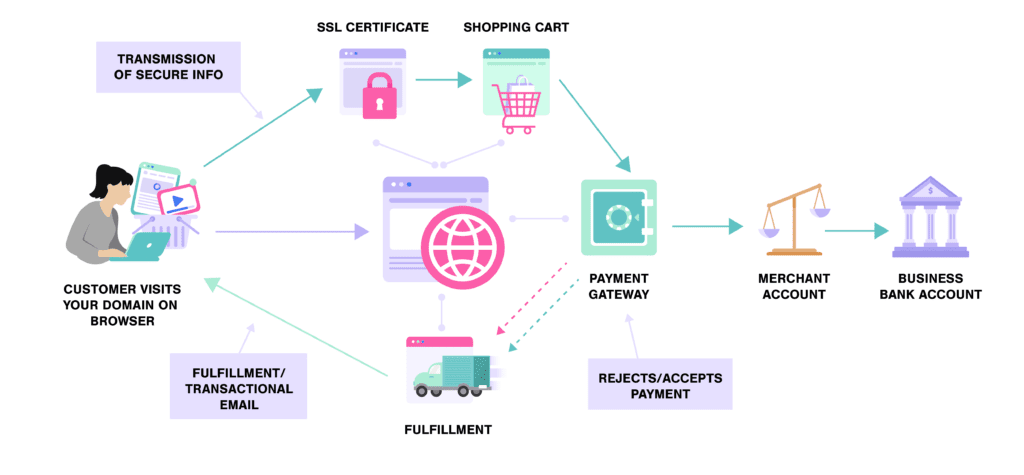
Ecommerce Shipping Best Practices
There are a few strategies you can implement to boost your ecommerce shipping sales. Try some of these best practices when you’re implementing your shipping solutions.
- Place a threshold or purchase limit for free shipping (example: free shipping when you spend $49)
- Provide multiple shipping options to avoid large costs and abandoned carts
- Offer international shipping options to increase your audience size
- Use a multi-carrier shipping software to cut down on your shipping costs and to offer more options to your customers
- Offer free shipping and expedited shipping to your customers
- Offer tracking numbers to customers
What Does Shipping Software Do?
You’re growing your ecommerce business, and you’re looking for a way to scale. That’s where shipping software comes in!
The best thing about these solutions is that they are easy to use – even if you are new to the world of ecommerce.
Ecommerce shipping software helps you automate the shipping process. These tools integrate with ecommerce platforms and marketplaces for a streamlined experience with shipping and delivery.
Each shipping software has its own benefits. But typically, you can expect it to include:
- Bulk shipping label creation
- Competitive pricing on shipping rates
- Ways to customize your labels with your branding
- Integration with most major ecommerce platforms
Plus, they work with multiple carriers so you can have the best rates for your needs.
Types of Logistics Software
Logistics software helps you manage every part of your production process. When you’re looking at the software options for your ecommerce business, it’s important to understand every step of your customer’s journey once they hit that purchase button.
Understanding the Shipping Process
The shipping process includes everything you need to get your order out the door. The first step in this process is making sure you have all of the data you need for the order. This includes your customer’s address, any notes, and checking for multiple orders from the same customer.
The shipping process also includes picking your shipping carrier and software solutions. This second step also factors in weighing the order for accurate shipping costs. And don’t forget to affix the shipping label!
The last step is to get the package shipped. Beyond just getting the item in the hands of the postal carrier, this also includes providing tracking information.
Understanding Inventory Management
Inventory management makes sure you have enough inventory to fulfill your orders. This includes keeping track of your inventory, stocking and restocking items, and inventory forecasting.
Inventory management helps you ensure that you don’t run out of stock unexpectedly. You can be prepared and, as a bonus, you can save money on storage space you don’t need.
Understanding Fulfillment
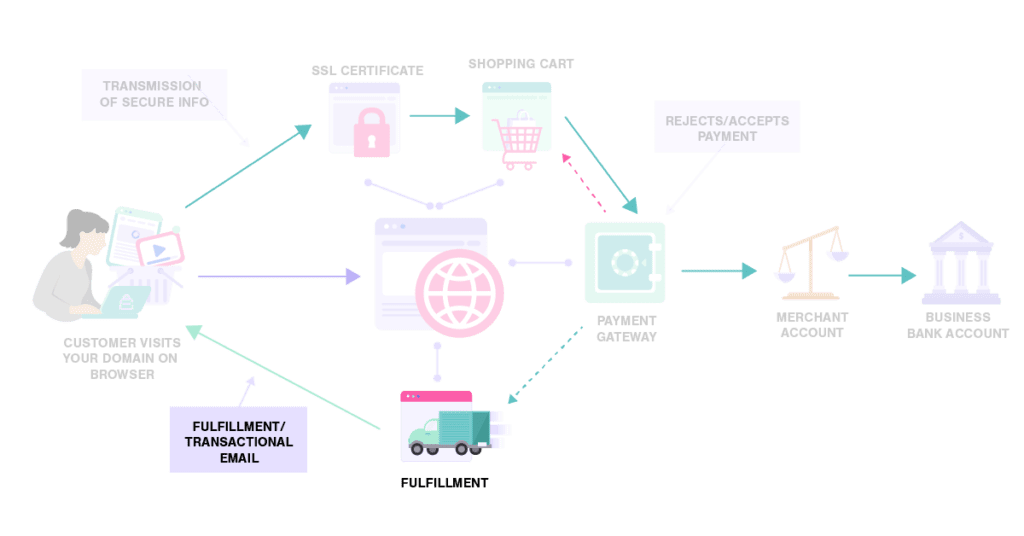
Fulfillment is the stage in which the order is executed for the customer. Most frequently, ecommerce businesses rely on a third-party logistics provider to fulfill the order for them. This all happens in a fulfillment center or warehouse.
Some companies, including shipping providers like FedEx, offer fulfillment services for ecommerce businesses. The way it works is that an ecommerce business sends the products to the fulfillment center, where the inventory is then stored. Then, when a customer makes an online order, the inventory is packed and shipped from the fulfillment center.
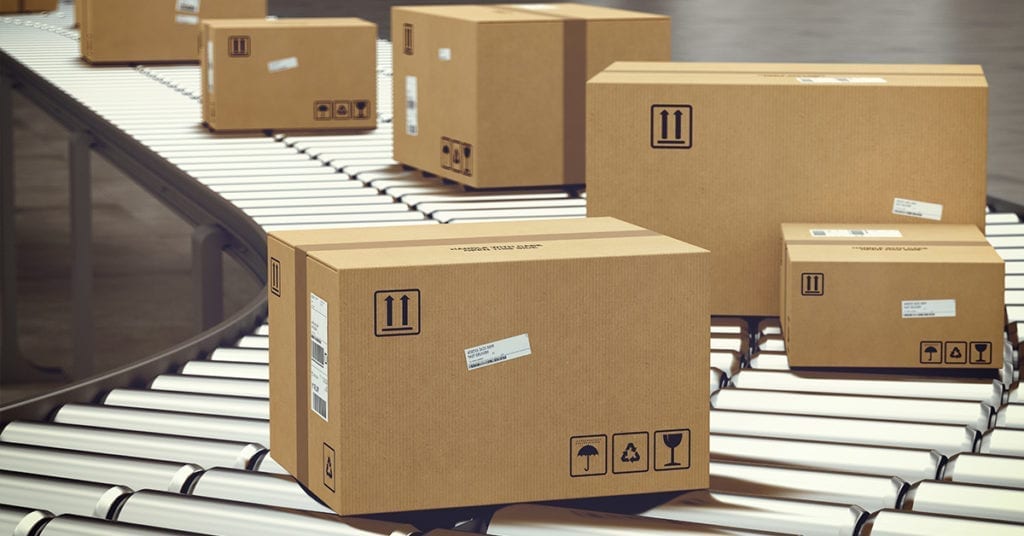
What If I Don’t Have Storage Space for Inventory?
If you’re dropshipping, then this process is a bit more streamlined. Dropshipping is a way to sell products without any upfront costs.
You don’t need to invest in inventory or warehouse space, you simply find the product on an eCommerce platform and list it for sale. When someone buys your product, you pay the manufacturer directly with no risk of being stuck with unsold goods.
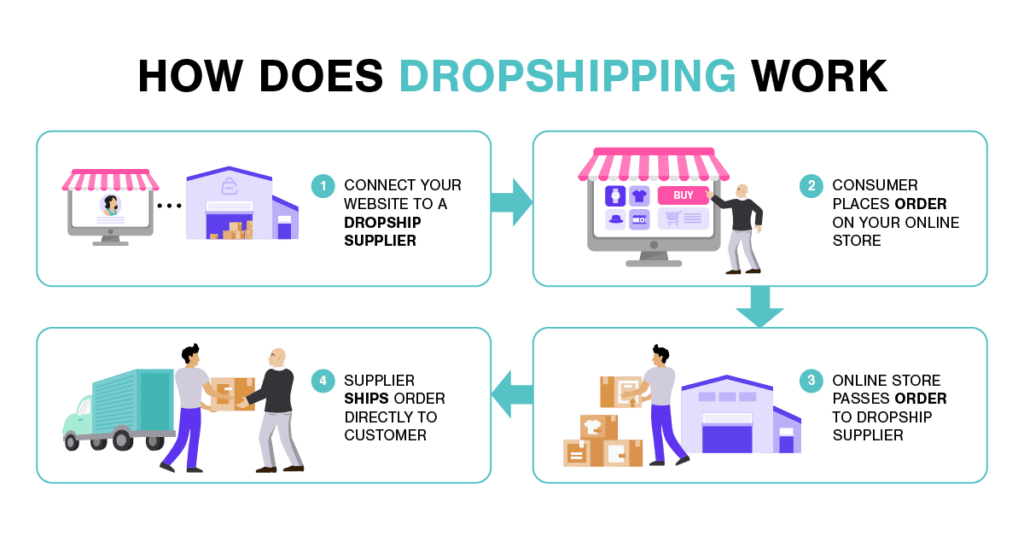
Most drop shippers will use their branding on products so customers never know that it was dropshipped. If you’re a small business owner with limited space for inventory, then dropshipping is a great option.
Understanding the Software
Ecommerce shipping software makes this whole process easier. Ecommerce shipping and inventory management software synchronize with your online store with integrations. This helps you process orders with shipping presets and workflow automation to save you time and money.
It also provides tracking information for your buyers, which enhances the delivery experience. You and your customers can receive tracking information in real-time.
The software also integrates with multiple shipping carriers to offer ecommerce shipping rate options that are affordable for small business owners. Some, like FreightPOP, also offer freight shipping deals.
Not only do they offer steep discounts on shipping for business owners, but your buyers can benefit, too. Many software options calculate shipping on purchases. This gives your buyers the chance to see what the cheapest option is for them or if flat rate shipping is available, which makes it more likely that they’ll follow through on the sale.
Each one is going to be a bit different. This is why it’s critical to really examine all of their features and determine which is the best shipping software for your business.
Logistics Software Solutions
Logistics software is an invaluable tool for any company that needs to manage the flow of goods from point A to point B, and it can help your business do so much more than just ship items.
Logistics software solutions are designed to be simple enough for even the least tech-savvy user, but they offer robust features that allow companies of all sizes to streamline their operations.
Our top logistics software includes ShipBob and Quickbooks. These third-party logistics (3PL) companies are great solutions for any business due to their ease of use and services.
ShipBob
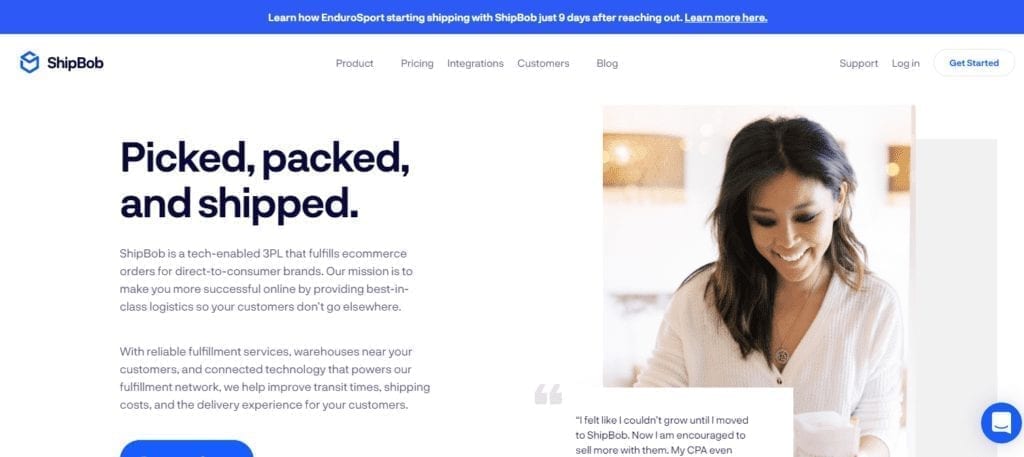
ShipBob is a great option for fulfillment services in both the United States and internationally. ShipBob ships orders to more than 220 countries and territories, making it an ideal solution for business owners shipping internationally.
ShipBob integrates with many large ecommerce platforms and marketplaces. ShipBob includes features that make it easier for you to fulfill your orders. This includes receiving, storage, pick-and-pack, standard packing, and shipping. It’s a great one-stop solution for order fulfillment.
Quickbooks
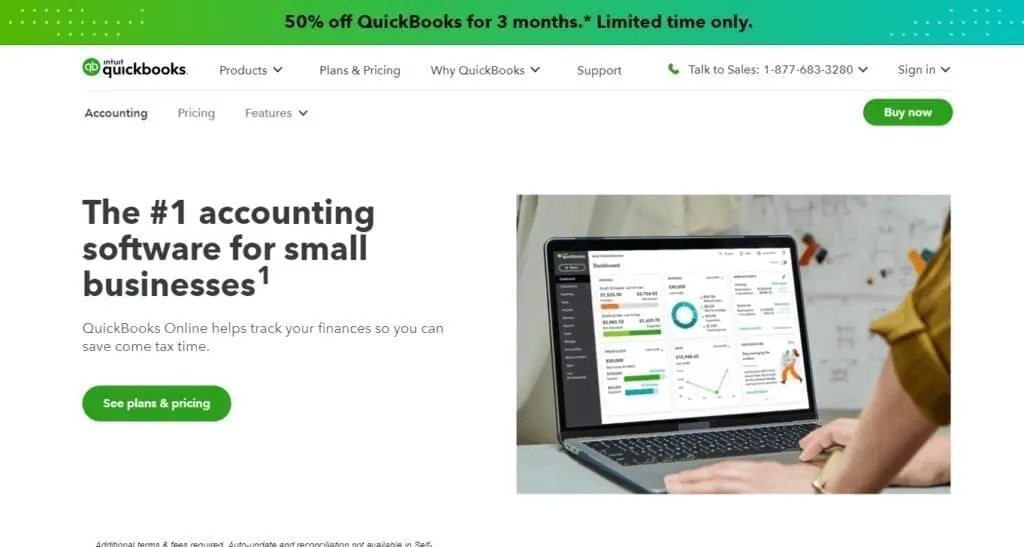
When it comes to inventory management, Quickbooks is a great solution for all businesses. Their platform is easy to use and they integrate with plenty of third-party tools, creating a seamless experience for business owners.
Quickbooks’ inventory management services update your stock in real-time. The quantities automatically update, plus they offer an inventory calculator so you can make sure you stock just the right amount. They also offer plenty of insights to help you understand your consumer behavior. Quickbooks’ plans start at just $40 per month.
How to Choose the Best Ecommerce Shipping Platforms
When you’re looking for an ecommerce shipping solution, you want to make sure it includes all the essentials. After all, the whole point is to make the experience streamlined and easier for you to run your business.
This means you should look for features like:
- Label printing and the ability to batch print
- Integrations with platforms like WooCommerce, Magento, Shopify, and more
- Discounted shipping rates
- Plenty of carrier options
- Tracking and return support
- Ability to sync your sales channels all to one place
- Fast shipping
- International options
- Great customer service
All in all, it should bring your ecommerce shipping costs down. Having features that support your business saves you time, energy, and money. Plus, they can boost customer satisfaction.
Top Ecommerce Shipping Software Options
Do you need a shipping solution for your ecommerce business? Or are you running a small shop and wondering how to get your products delivered quickly and efficiently?
You’re not alone!
Shipping can be one of the most difficult parts of any online business. As a small business owner or ecommerce store, you’re always looking for the best shipping solutions to keep your customers happy.
So, we’ve rounded up the top seven best shipping software solutions for ecommerce businesses. In this comparison, we’ll round up the pros, cons, and pricing details for our top picks.
ShipStation
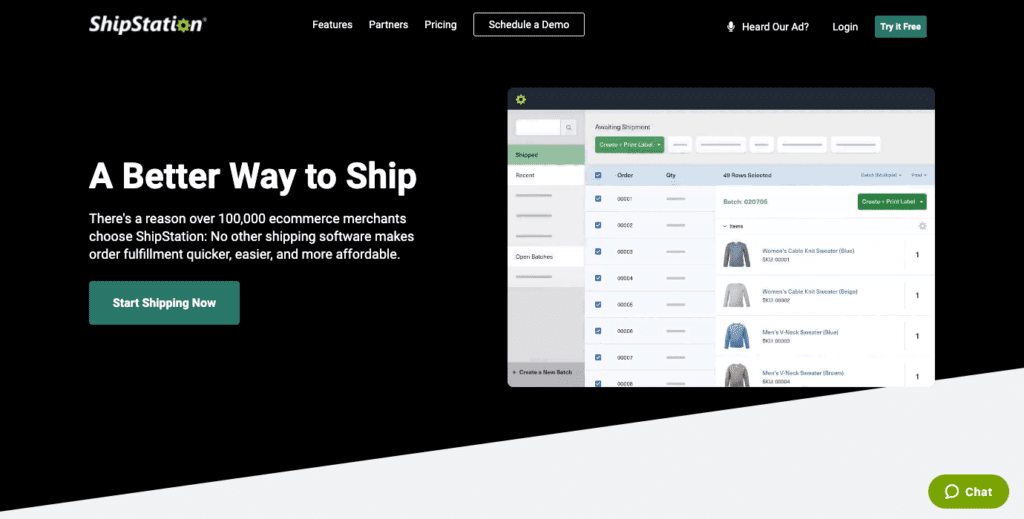
ShipStation is one of the best shipping software solutions for small business and mid-sized business owners.
ShipStation offers a variety of integrations with eCommerce vendors, including Shopify, BigCommerce, Squarespace, and more. They also integrate with most postal carriers and offer discounts on USPS Priority & Express shipping.
With ShipStation, you can print your branded packing labels and shipping labels in bulk. Their service also includes a return label that you can include with all of your shipments. You also get an account with stamps.com included with your ShipStation service.
Pros
- Over 350 integrations with eCommerce and shipping vendors
- Offers a free trial
- Easy-to-use user interface
Cons
- Support options dependent on your plan
- No free plans are available
- Limited packages per month on smaller plans
Pricing Information
ShipStation has numerous plans available to fit most budgets. Their six pricing tiers start at just $9 per month for 50 shipments, which resets monthly. Their enterprise plan is $159 per month for 10,000 shipments and 10 user spots on your account.
Shippo
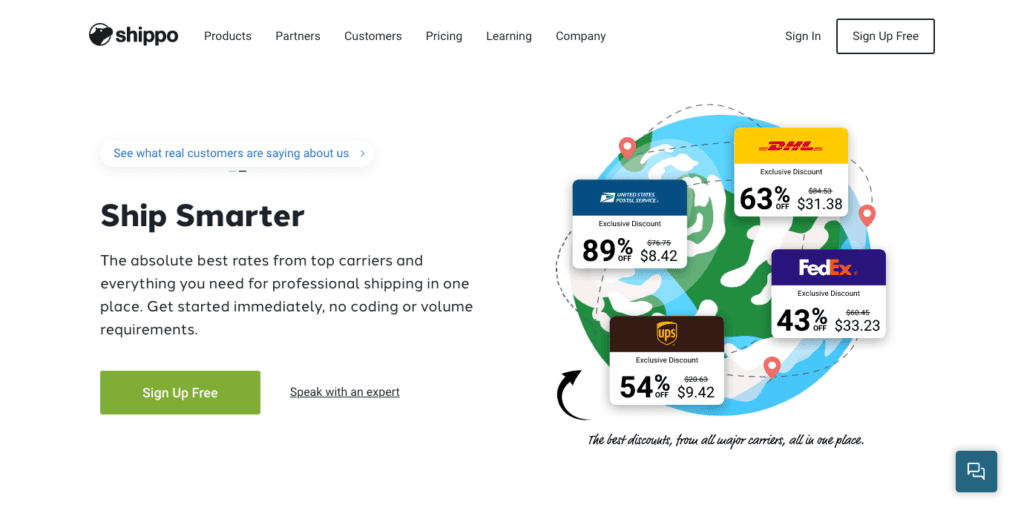
Shippo is a great choice for small business owners. If you don’t have a large volume of orders just yet, Shippo offers a free plan.
Shippo’s free plan offers enough features to get you started. You pay as you go with shipping labels, which are five cents each. If you select their Professional or Premier Plan, then shipping labels are included.
Shippo is also a great option if you’re doing a lot of shipping worldwide. They partner with tons of international shipping carriers. Plus, they work with these carriers directly to offer steep shipping discounts.
Pros
- Integrates with 85+ shipping carriers and ecommerce platforms
- Free version available
- Free trial available for paid plans
Cons
- Limited customer support to live chat and email
- Fewer pricing tiers
Pricing Information
Shippo has three pricing tiers available. Their free plan does not include branding, packing slips, emails, or tracking. However, the free version is ideal for small business owners who are just getting started and might not have the budget for a more all-inclusive platform.
Shippo’s Professional plan includes branding on your packing slips, plus automated workflows for an easy experience for you and your customers. You can have five user accounts on this plan.
You’ll have to contact Shippo for Premier plan pricing. Their Premier plan includes everything in the Professional version, plus a dedicated customer support team member who can help you with technical implementation.
All of their plans include global carrier discounts and unlimited platform integrations.
Easyship
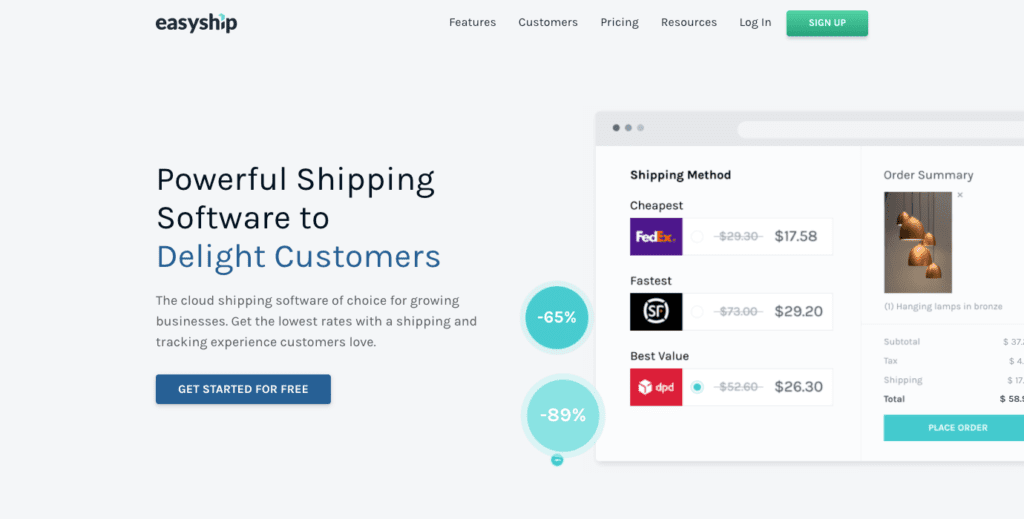
If you’re shipping internationally, Easyship offers some great discounts on international couriers. Easyship offers real-time shipping rates at checkout. This way, you can save a lot on shipping, especially for international orders.
Easyship’s shipping management tool is cloud-based. All of your shipments are accessible via their dashboard, where you can automate your process with custom shipping rules. Their tools also generate packing slips for you.
Pros
- Over 250 courier services are available
- Creates tax and customs documents for you
- Free 30-day trial available
- Free plans available
Cons
- Limited packages per month on smaller plans
- Customers can only utilize real-time rates at checkout if they have an annual plan with Shopify
Pricing Information
Easyship has a free plan where you can pay as you go for shipping labels. This plan limits you to 100 packages per month. Their Plus plan allows for 500 packages for $29 per month, making it an affordable solution for small businesses.
If you’re shipping a larger volume, you can get 2,500 packages for $49 monthly on their Premier plan. Enterprise plans are also available.
Essential Hub
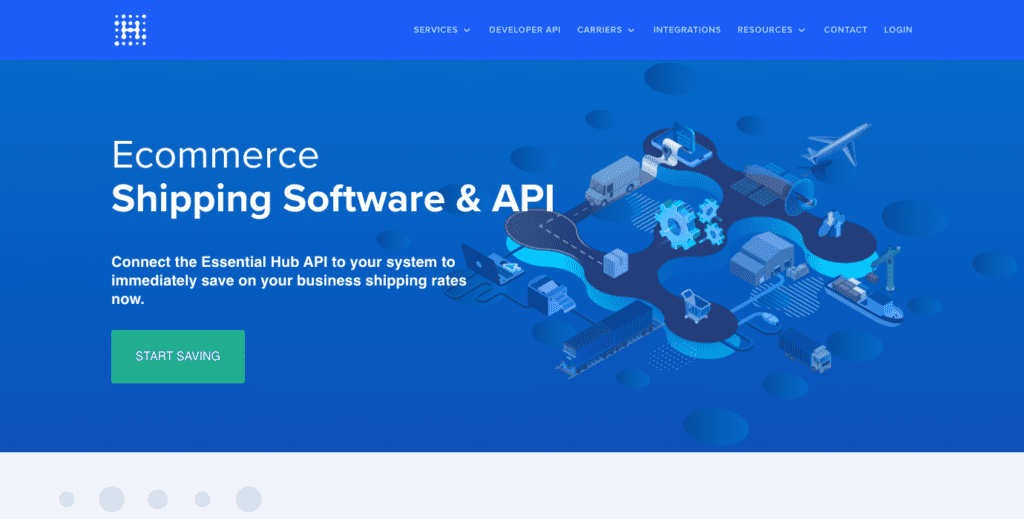
Essential Hub offers a variety of shipping solutions for ecommerce business owners. Essential Hub lets you instantly connect and sync your integrations into the service. Essential Hub will automatically detect the lowest shipping rates for you and help you get your customers their orders quickly.
Essential Hub also offers detailed reports. Their analytics are especially helpful for managing return labels and inventory management patterns.
Pros
- Free trial available
- A free version is available
- A large variety of integrations are available
Cons
- Not as many automations available as other platforms
- Less international shipping methods are available compared to other platforms
Pricing Information
For pricing information, contact Essential Hub. Pricing for larger volume shippers begins at $50 per month. Their pricing is usage-based.
ShipEngine
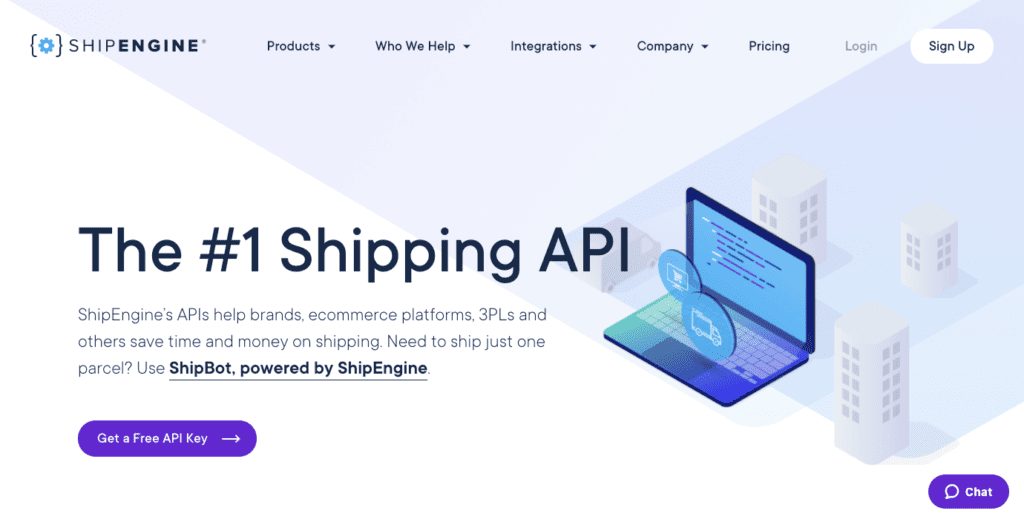
ShipEngine offers an API that can streamline your order fulfillment and shipping processes.
ShipEngine’s shipping APIs allow you to compare real-time shipping rates (and discounts) across 30+ carriers and integrations. You can also use their API to track your packages and delivery in real-time.
ShipEngine’s API also lets you validate your addresses on a global scale. This way, you can reduce the number of returns from incorrect customer data.
Pros
- No contracts
- Free developer account available
- Free trial available
Cons
- Less integrations than other platforms
Pricing Information
ShipEngine offers many pay-as-you-go options so you can only pay for what you need. Their usage-based pricing is based on the estimated cost of how many packages you send out per month.
ShipWorks
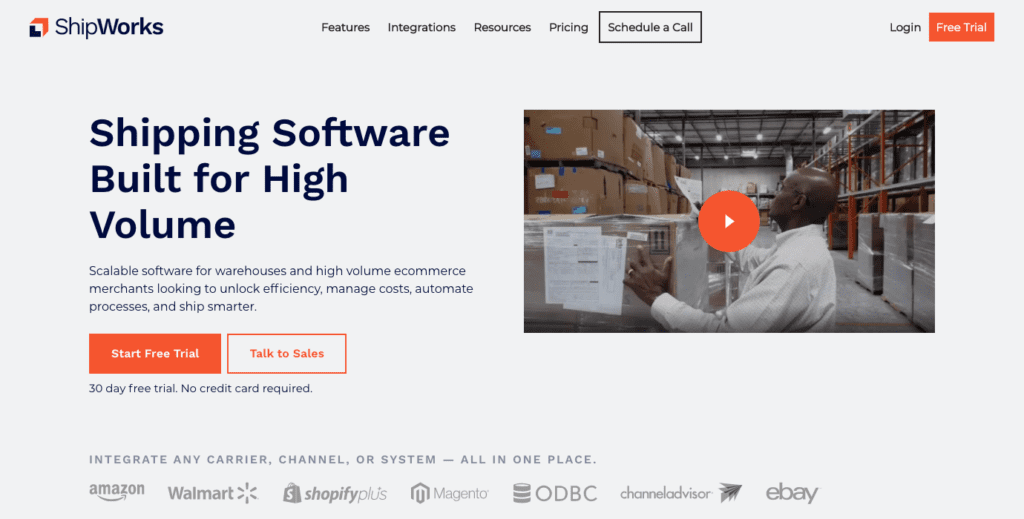
If you’re dealing with high inventory volume, then ShipWorks is a great choice for you. If you have thousands of shipments every month and are dealing with warehouses, then you’ll find that ShipWorks can help you streamline your process.
Pros
- Best for high-volume shipments
- Unlimited users on all plans
- Free trial available
Cons
- No free version
- Not as budget-friendly for smaller businesses
Pricing Information
ShipWorks is best for larger ecommerce businesses. While they are more expensive than some of the other ecommerce solutions on this list, they offer thousands of more shipments per month in their plans.
Their Ecommerce Essential plan, which is the first tier, is $49 per month. With this plan, you get 1,500 shipments per month.
ShipWorks has five different pricing tiers. Their most popular is Warehouse Essential for $349 and 12,000 shipments per month. Their highest plan, Warehouse Elite, allows for 50,000 monthly shipments per month at $799.
Stamps.com
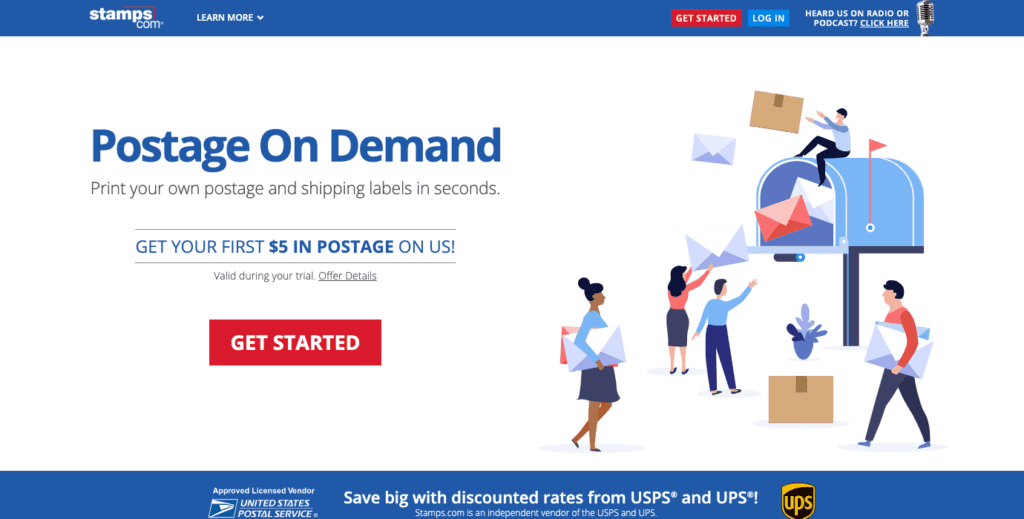
Stamps.com has an easy-to-use interface for small business owners who need something simple yet effective.
Stamps.com’s ecommerce shipping software lets you import your orders from sites like Amazon, Etsy, and eBay so you can print pre-paid shipping labels with USPS.
Since Stamps.com is partnered with USPS, this is a great choice for ecommerce business owners who primarily ship via USPS.
Pros
- Easy to import your data for batch shipping
- Postal analyzer checks data for you
- Free trial available
Cons
- Limited shipping carrier options
- No free version is available
Pricing Information
Stamps.com’s ecommerce shipping software starts at $15.99 per month. This includes support and training, plus discounted shipping rates via USPS.
How do I Ship with Shopify?

If your online store is through Shopify, then you’re in luck. Shopify has its own shipping program that shop owners can utilize.
Shopify Shipping allows you to purchase shipping labels directly on the platform. You can also print multiple labels at a time for when you have a lot of orders coming in.
Shopify Shipping works with multiple postal carriers, including USPS, UPS, and DHL Express for United States shop owners. They also work with Canada Post and Australia’s Sendle. Shopify works with major shipping carriers to offer competitive or discounted shipping rates for ecommerce business owners.
Shopify Shipping features include overnight delivery, order tracking details, shipping insurance, and package pick-ups. Additional services may be available depending on your location and your selected carrier.
How to use Shopify Shipping
- Pick the order you are fulfilling
- Add the package details
- Select your shipping carrier of choice
- Select the shipping service you’d like to use
- Review and print your shipping labels
- Add labels to your packages
- Schedule a package pickup (if applicable) or drop the packages off at the carrier’s location
Additional Ecommerce Shipping Companies
The seven platforms above are all great options if you need to get started or make changes to your current shipping process.
Of course, there may be other systems that work well for companies with different needs.
If you’re looking for a new shipping company to partner with but don’t know where to start, we’ve got a few more names for you. If you’re still unsure or want to explore every avenue, here are some additional ecommerce shipping solutions.
- OrderCup is a web-based order management software that automates your shipping processes on a global scale.
- Ordoro is a popular option for dropshipping ecommerce businesses and also offers a barcode scanning feature to cut back on fulfillment errors.
- Freight Club is shipping software for small to mid-sized businesses looking to ship with freight rates.
- ShipRush is a cloud-based order management software that connects your shipping carriers and your small to mid-sized business.
- ShipperHQ is a cloud-based ecommerce shipping software that is included with BigCommerce’s Enterprise plan.
- FreightPOP is a cloud-based logistics management software for freight forwarding.
- ShipMonk’s multichannel order fulfillment software connects to your shopping cart to integrate your online store.
- ShippingEasy is inventory management and shipping software for ecommerce businesses.
- Freightview allows you to compare prices of freight software as you manage your shipments.
If you aren’t ready to commit to a full-service shipping management software yet, you can also try Pirate Ship. Pirate Ship is a free shipping software that offers discounts on postage rates. However, as your business gets bigger, you might outgrow Pirate Ship.
Top Shipping Solutions For Ecommerce
Shipping is one of the most important aspects of any ecommerce business.
A lot goes into shipping, from calculating rates and figuring out which carrier best suits your needs, to packing and sending your products. It’s not an easy task!
Shipping can be costly too, so you must find a solution that will work for you. Out of all the solutions available, these are our top three shipping solutions:
- ShipStation is the top pick for overall shipping software. Their vast array of pricing options and integrations make it a great choice for anyone on any budget.
- ShipBob is the top pick for fulfillment. They’re easy to use no matter where you’re located and provide plenty of features that make the order fulfillment process easier for business owners.
- QuickBooks is the top pick for order management. With inventory tracking that syncs automatically to your website, it helps take some of the guesswork out for business owners. Quickbooks’ automation and integrations make an easy experience for ecommerce sales.
Final Thoughts
Your shipping software should not only free up your time as a business owner but also enhance the customer experience. Providing tracking information to your customers will give them ease of mind once they hit purchase in their shopping cart.
If you still aren’t sure what the best shipping software is for your business, then you may need to try a few of these shipping options. Most of them offer free trials with no credit card required, so you can see which of these ecommerce shipping options is right for you.
If you’re looking for a good shipping software solution to help with your ecommerce business, there are many options available. There’s no shortage of platforms out there, so don’t be afraid of trial and error as you find out what works best for you.
Did I miss your favorite ecommerce shipping software? Did you try one of these and love or hate it? Let me know in the comments.


